Language learning is a commitment. That much is clear. As with any other skill, learning a new language takes dedication, motivation, patience, and, most importantly, time.
But… how much time, exactly?
Responding to this question with just one, solid answer is difficult. However, we will do our best to tackle the challenge and provide the most straightforward response possible.
First, one must remember that there are many factors influencing how long it will take to learn a new language. The most basic ones include:
1. What language do you want to learn?
The Foreign Service Institute (FSI) has made answering the challenging question of “How long does it take to learn a new language?” much easier. They have divided languages into 4 distinct groups, based on their difficulty in relation to their level of similarity to the English language.
English is the only language belonging to the fifth group, known as “Group 0”. This is because the entire scale was created in relation to the English language, so it constitutes the starting point for classifying other languages.
Each group was then assigned an estimated time required to learn the languages belonging to each category, expressed in class hours or weeks.
Please note that we will only discuss European languages for the purpose of this article. For the full list of languages, please visit the official Foreign Service Institute page.
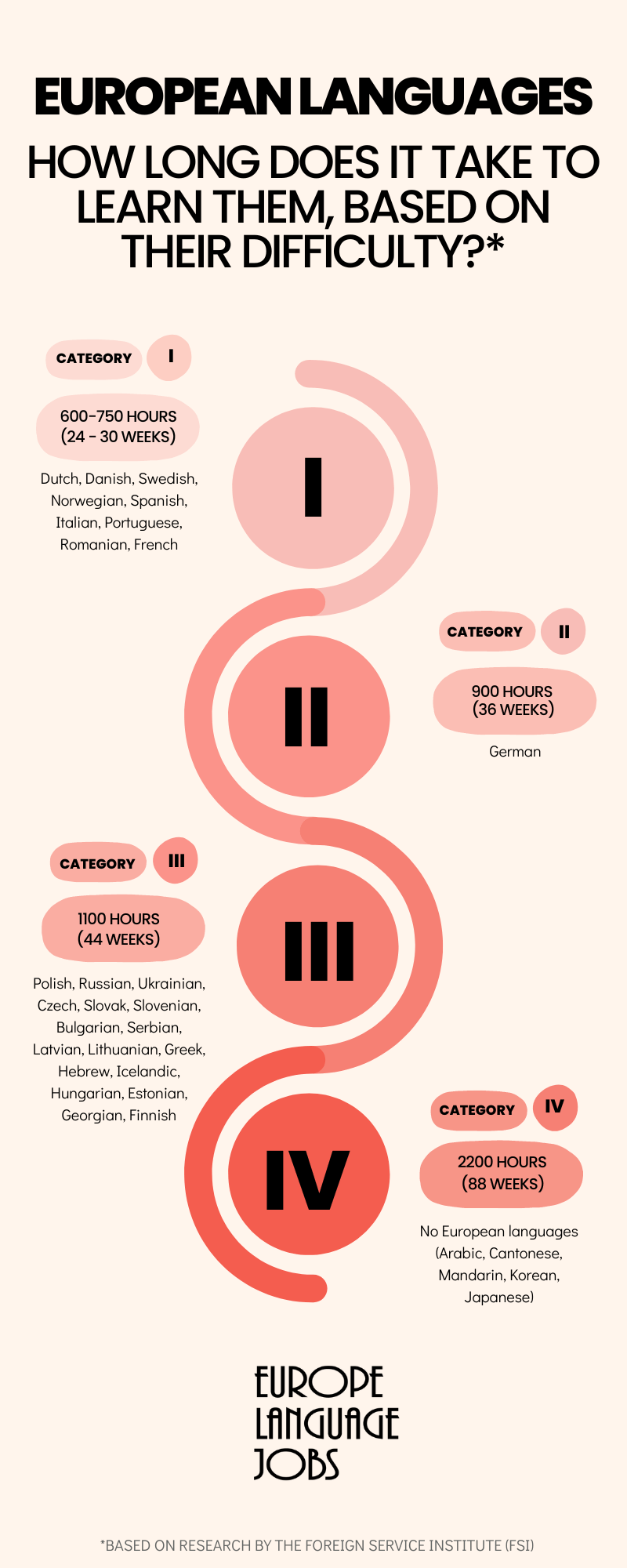
The categories go as follows:
1. Category I (600 - 750 hours / 24 weeks)
*French is the only language in this group with an estimated learning time of 30 weeks, rather than 24. This is due to the complicated vocabulary and grammar, as well as the difficult pronunciation compared to other languages from Category I.
2. Category II (900 hours / 36 weeks)
*You may find some sources classifying German as a Category I language. The official source (FSI); however, identifies it as the only European language belonging to Category II. Its increased level of difficulty in relation to English is justified by the irregularities of verbs, gendered nouns, and complicated sentence structure.
3. Category III (1100 hours / 44 weeks)
-
Slavic (Polish, Russian, Ukrainian, Czech, Slovak, Slovenian, Bulgarian, Serbian, Croatian)
-
Baltic (Latvian, Lithuanian)
4. Category IV (2200 hours / 88 weeks)
-
No European languages are classified in this group. It includes: Arabic, Cantonese, Mandarin, Korean, and Japanese.
In some sources, you will find 5, or even 6 categories. Sometimes, Category V, or even Category IV* are identified as separate groups. However, for the purposes of this article, we follow the official classification imposed by the FSI, which recognises 4 official categories.
An obvious limitation of this system is that classifies all languages in comparison to English. That means that it’s only fully relevant to native English speakers. The categories might be slightly different for those with a mother tongue other than English.
For example, for me as a Polish native speaker, languages from Category III, which, according to FSI would be the most difficult European languages to learn for a native English speaker, would be much easier and belong to Category I. Dutch and the Nordic languages, which for English speakers are presumably the easiest to learn, would surely fall into Category III for me, despite having a near native level of English.
Similar systems have not been developed for native speakers of other languages, so we can only use the one created for native English speakers as a reference.
2. What level of language proficiency do you want to achieve?
Languages are learnt for different purposes. Some will aim to achieve full working proficiency to find a job in this language or move to a country that speaks it, while others will be happy with the basic knowledge that will allow them to “get by” while they travel.
There are 2 standard systems of classifying language proficiency that are most commonly used. The first one, CEFR, is popular in Europe, while the other, IRL, is mostly used in America.
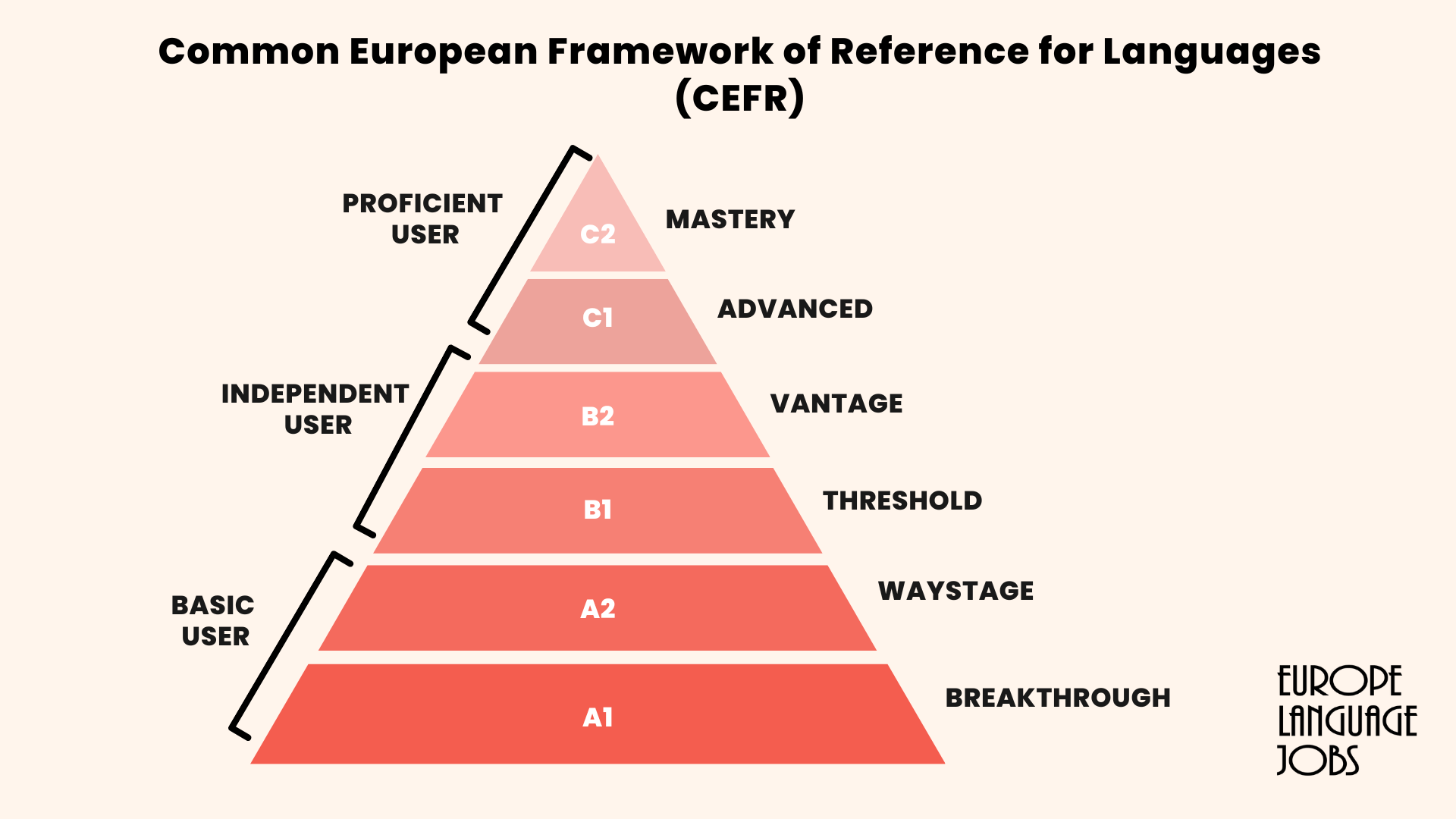
Common European Framework of Reference (CEFR)
-
A - basic user
-
B - independent user
-
C - proficient user
Each category is additionally divided into 2 levels, so the framework goes from A1 to C2.
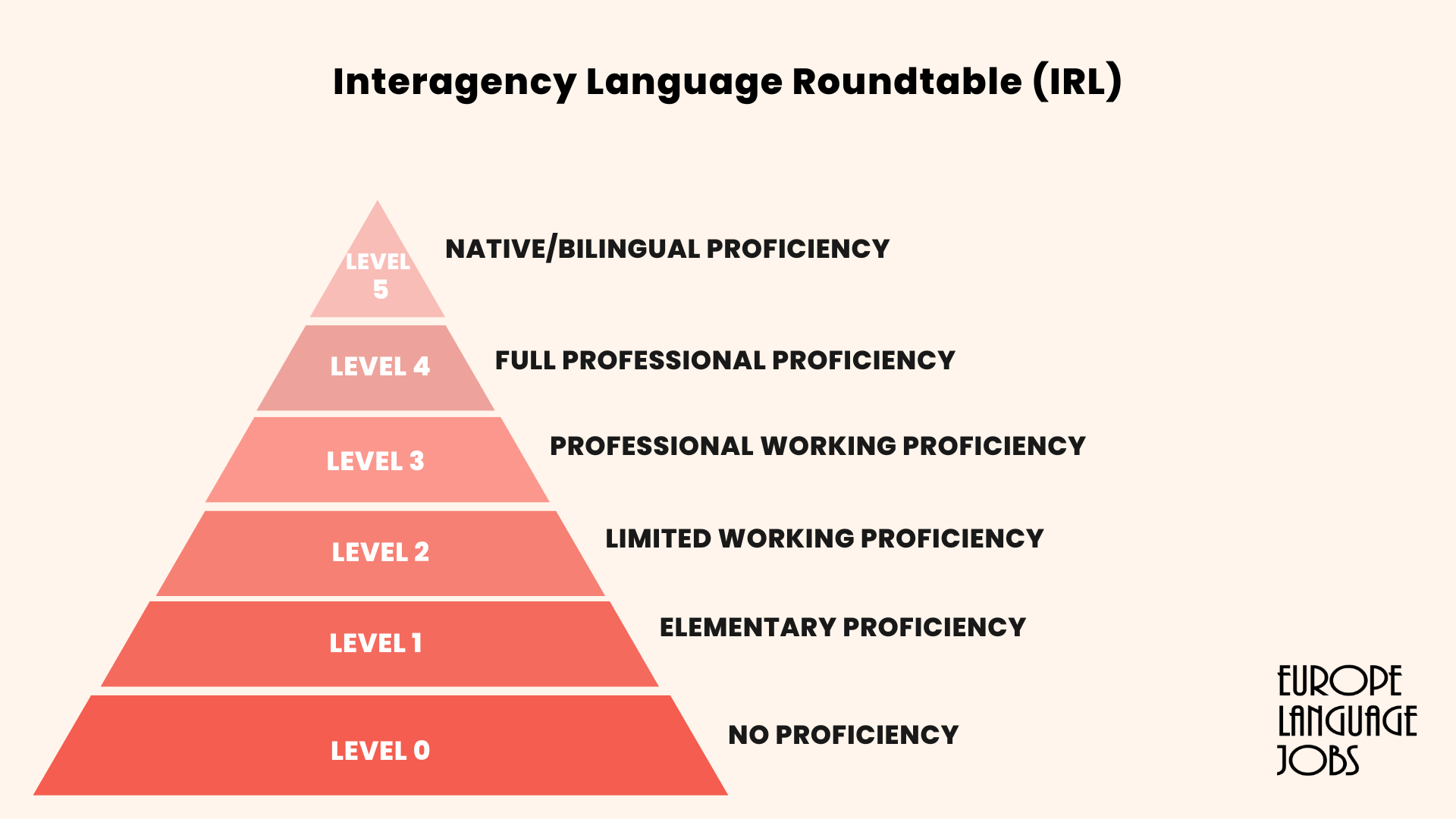
Interagency Language Roundtable (ILR)
-
Level 0 - no proficiency
-
Level 1 - elementary proficiency
-
Level 2 - limited working proficiency
-
Level 3 - professional working proficiency
-
Level 4 - full professional proficiency
-
Level 5 - native/bilingual proficiency
According to Dr Gareth Popkins, the owner of How to Go Fluent, these are the approximate time frames for achieving each level for both frameworks:
-
A / Level 0 & 1: 80 - 100 hours
-
B / Level 2 & 3: 200 - 400 hours
-
C / Level 4 & 5: 550 - 900 hours
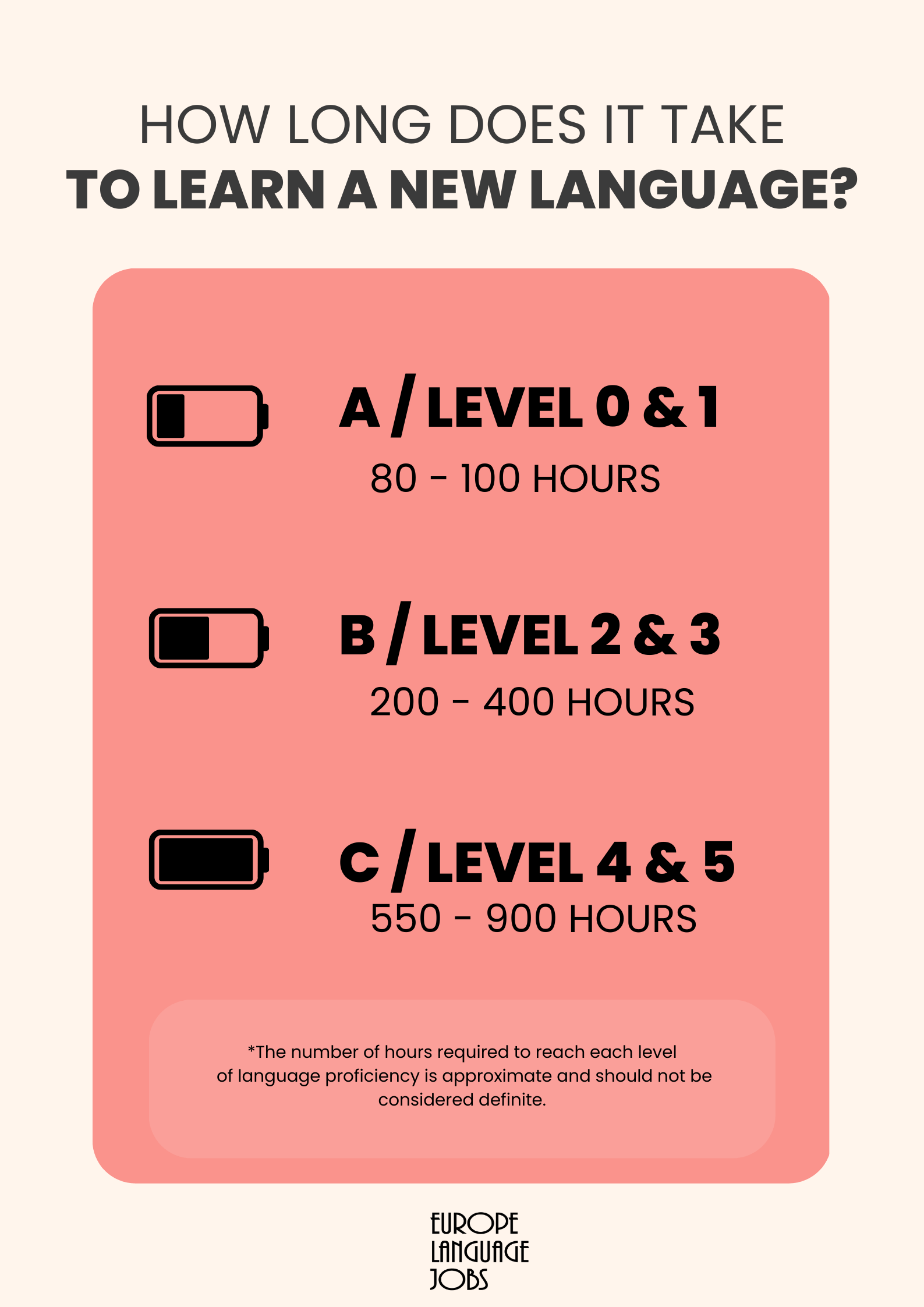
These time frames, although helpful, cannot be interpreted as definite. They give a general idea of how much time, at minimum, you should expect to dedicate towards reaching each level of fluency.
However, as you have already seen in the previous point, how long it will take to learn a new language depends largely on the language family it belongs to and its difficulty (as well as on several other factors, which we will discuss in detail in a moment).
Therefore, you shouldn’t approach these numbers as set in stone. They’re approximations that may help you get a general indication of the commitment required on your side, but bear in mind, it may (and probably will) actually take a bit more time.
3. How many languages do you already speak? What are they?
The number of languages you already speak and what they are has a big impact on how long it will take you to learn another. Speaking multiple languages will make the process of learning a new one easier in some aspects, and more difficult in others.
Now, we’re aware this might sound a bit confusing, so let us illustrate it with an example.
French and Spanish belong to the same language family of Romance languages. Their grammar structures are similar enough, which gives you an advantage in learning one if you already know the other.
However, things get much more complicated when it comes to vocabulary. False friends are common, and it’s sometimes difficult to attribute a new meaning to a word you’ve already coded as having another.
For example, the Spanish word “el gato” means cat. The French word “le gateau”, which is pronounced in exactly the same way (although with a slightly different accentuation), means cake.
French speakers, beware of saying you ate your cat! Spanish speakers, don’t sound silly by saying you have a cake named Poppy!
Translation studies acknowledge 3 basic languages groups:
Languages A are languages you can confidently speak and translate into. In other words, those are the languages you consider yourself native or multilingual in.
Languages B are languages you know very well, but not enough to be considered a native speaker. You are familiar with their grammar, have an extensive vocabulary, and can easily communicate in them.
Languages C are languages which you don’t know first-hand, but which you understand thanks to knowing other languages. Most commonly, these are the languages you can’t speak, but which you will understand when you hear them or see them written down.
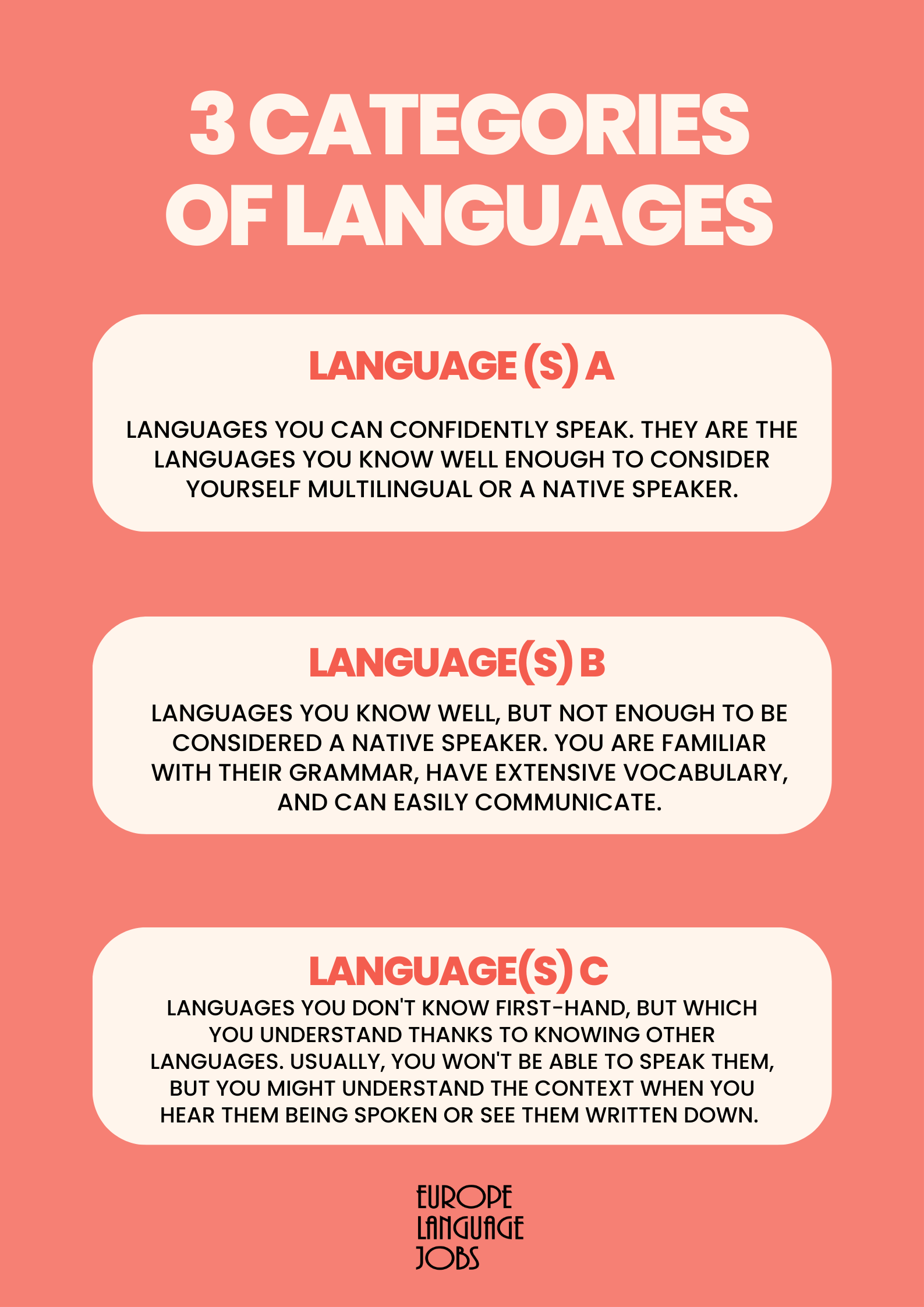
Everyone speaking at least 2 languages functions in all 3 categories. Perhaps illustrating it with my own example will make it clearer:
Languages A: Polish and English
Languages B: Spanish and French
Languages C: Czech, Slovak, Croatian, Serbian, Bulgarian (because of Polish), Italian and Portuguese (because of Spanish), Dutch and German (because of English)
I also understand spoken Ukrainian and Russian, but can’t read the Cyrillic alphabet, so I don’t categorise them as my C languages.
So, if you want to learn another language fast, you can carry out a similar analysis of the languages you already know to help you identify the languages you might learn the quickest. If a language is already on your list of C languages, learning it properly will most likely require less effort on your side, as it is similar to another language you are fluent in.
However, in my case, if I chose to learn Japanese, the other languages I know wouldn’t be of much help. I might find the process in itself easier, as I am already familiar with what learning a new language generally looks like. However, Japanese is different enough from other languages I know, I might have to abandon the approaches I’d used before and adopt an entirely new one.
Comparing it to Romance languages, where the sentence structure, grammar, and even the alphabet are completely different, might actually slow me down and be a potential setback. It is much harder, after all, to let go of old habits and replace them with new ones, rather than form them from scratch.
4. What are your language learning predispositions?
Everyone can learn to speak a new language. Some people just find it easier than others.
Howard Gardner’s Theory of Multiple Intelligences recognises 8 types of human intelligence:
-
Spatial intelligence
-
Bodily-kinesthetic intelligence
-
Musical intelligence
-
Linguistic intelligence
-
Logical-mathematical skills
-
Interpersonal intelligence
-
Intrapersonal intelligence
-
Naturalistic intelligence
Now, we won’t go into detail when it comes to every single type of intelligence. We will only discuss the one relevant here, which is linguistic intelligence.
Those with a particularly developed linguistic intelligence are more sensitive to language patterns, tend to pay close attention to the meanings of words, and are particularly good at remembering things. All of those skills make it easier for them to learn new languages.
Of course, that is not to say that those with less developed linguistic intelligence absolutely cannot learn foreign languages. It is possible to be dominant in more than one intelligence category, and neither of them crosses out another.
If you are especially gifted in the field of musical intelligence, it doesn’t mean you can’t be good at mathematics. Similarly, if you are good at sports thanks to well-developed bodily-kinesthetic intelligence, that doesn’t mean you won’t successfully learn to play an instrument.
The same applies to languages. While those gifted in the area of linguistic intelligence will find it easier to learn a new language quickly thanks to the predispositions listed above, everyone can successfully study foreign languages.
Based on the types of intelligence you are particularly strong at, the time it will take for you to learn a new language may differ. Nothing is impossible but in moments of doubt, it is useful to remember our strengths and weaknesses. After all, we all have both.
5. What methods do you use in your language learning process?
In order to be able to call yourself fluent in a language, you need to successfully develop skills in all 4 key areas of language learning: speaking, listening, reading, and writing.
Now, the methods for each of those areas are different and it’s important not to neglect any of them. It is normal to find yourself excelling at one or two of those skills more than others.
For example, I have always found it much easier to read and write in a foreign language, while speaking and listening come to me with difficulty. Many of my friends are the exact opposites, so we support one another in our language-learning process by taking advantage of our biggest strengths.
When learning a language, you have to make sure you use different methods. Language apps are great, and they usually focus on all 4 skill areas, but they are hardly ever enough to make you fluent. Even if they potentially could get you to speak a language, it would take forever.
Never limit yourself to just one method. Reading books in the target languages, watching films, and having conversations with native speakers are all methods you should involve in your language-learning process. Neglecting either of them will set you back in one area, and you may struggle later on while catching up.
Similarly, take into consideration that learning a language on your own will probably take much longer than signing up for a course taught by professionals. Being self-taught isn’t impossible, but you should check up with a native or a certified teacher every now and then to make sure you’re not teaching yourself mistakes that will cost you a lot of energy to unlearn later on.
If you do decide to choose a language course, there are several factors you need to take into consideration. Choose the accurate level - starting too low will be a waste of money as you won’t make enough progress, and aiming too high will stress you out beyond reason. There is a thin line between being ambitious and sabotaging yourself by setting goals that are too high to achieve at a time.
Always aim for classes in small groups (3-5 people), or even one-on-one lessons. Those will be the most expensive ones, but also the most efficient.
Think about it this way: what will turn out cheaper in the long run? Paying €30/hour for a class with 15 people in it for 2 years, or shelling out €60/hour for one-on-one lessons for 6 months? You may pay double the price, but you will also significantly reduce the time it will take you to become fluent.
If you’re reading this article, you’re likely looking for ways to learn a new language quickly. Bear in mind, it might be an investment, but it will pay off!
6. How much time do you dedicate to learning a new language?
The key to effective language learning can be enclosed within one word: consistency. Like every skill, learning a foreign language requires daily dedication.
Now, it’s up to you how many hours daily you can and want to spend on practising. Some consider language learning a full-time job and spend a few hours every day memorising new words or doing grammar exercises. Others can’t afford to do that, and language learning will take up a smaller part of their daily schedule, either during their daily commute or in the evenings, after work.
We can’t always dedicate as much time to language learning as we’d like. That’s perfectly fine. You can still successfully learn a new language around your other daily responsibilities. It will take longer, but it’s not impossible.
How you manage your time depends on your own capabilities. If you dedicate 10 hours a week to learning a language, you will be able to reach basic user proficiency in about 8 to 10 weeks, which equals around 2 months.
If you can only spend 5 hours weekly on developing your language skills, that’s also fine. You just need to take into consideration that it will take twice as long to reach your desired level.
We can’t all quit our jobs to learn a new language quickly - that’s understandable. What matters is to find a few minutes every day to practice constantly and make sure you don’t fall behind.
7. How motivated and dedicated are you?
How motivated you are won’t necessarily speed up your language-learning process, but it can definitely slow it down.
This means that determination alone won’t miraculously help you learn another language fast. You will still need to practice, be consistent, and dedicate many hours towards reaching the desired fluency.
The good news is that it can be indirectly helpful in a way that you won’t lose sight of why you’re doing this, and the language-learning process will continue to please you.
However, it’s a double-edged sword. Losing motivation might get you to drop your efforts and bring achieving your goal to a temporary - or even permanent - halt.
Avoid falling into motivation highs, which are quickly followed by a sudden burnout. Dedicating a few minutes daily for an extended period of time will be slower, but also much more sustainable than signing up for an intensive language course, and never following up once it’s over.
As you can see, there are many factors impacting how long it takes to learn a new language. The answer will vary for everyone, depending on their personal background, possessed skills, methods used, and the time available.
One thing you need to keep in mind is that if you want to learn a new language quick, make sure to also make it effective. Things done under the pressure of time tend to be less sustainable than those to which we dedicate the necessary time and commitment.
Remember: all good things are worth every minute spent working on them, so sometimes it’s patience and dedication, and not a time limit, that will help you hone valuable skills!
Feeling inspired? Visit our blog for more career advice! How can you be sure the information we provide is top-notch? We are a group of professionals working with recruiters, career coaches, and HR specialists from all over the world!
Trust our experience and let us help you find a new job in Europe!










































Mohamed Yehia AG MOUME 1y ago
La langue la plus importante pour moi actuellement c'est l'anglais
La langue la plus importante pour moi actuellement c'est l'anglais